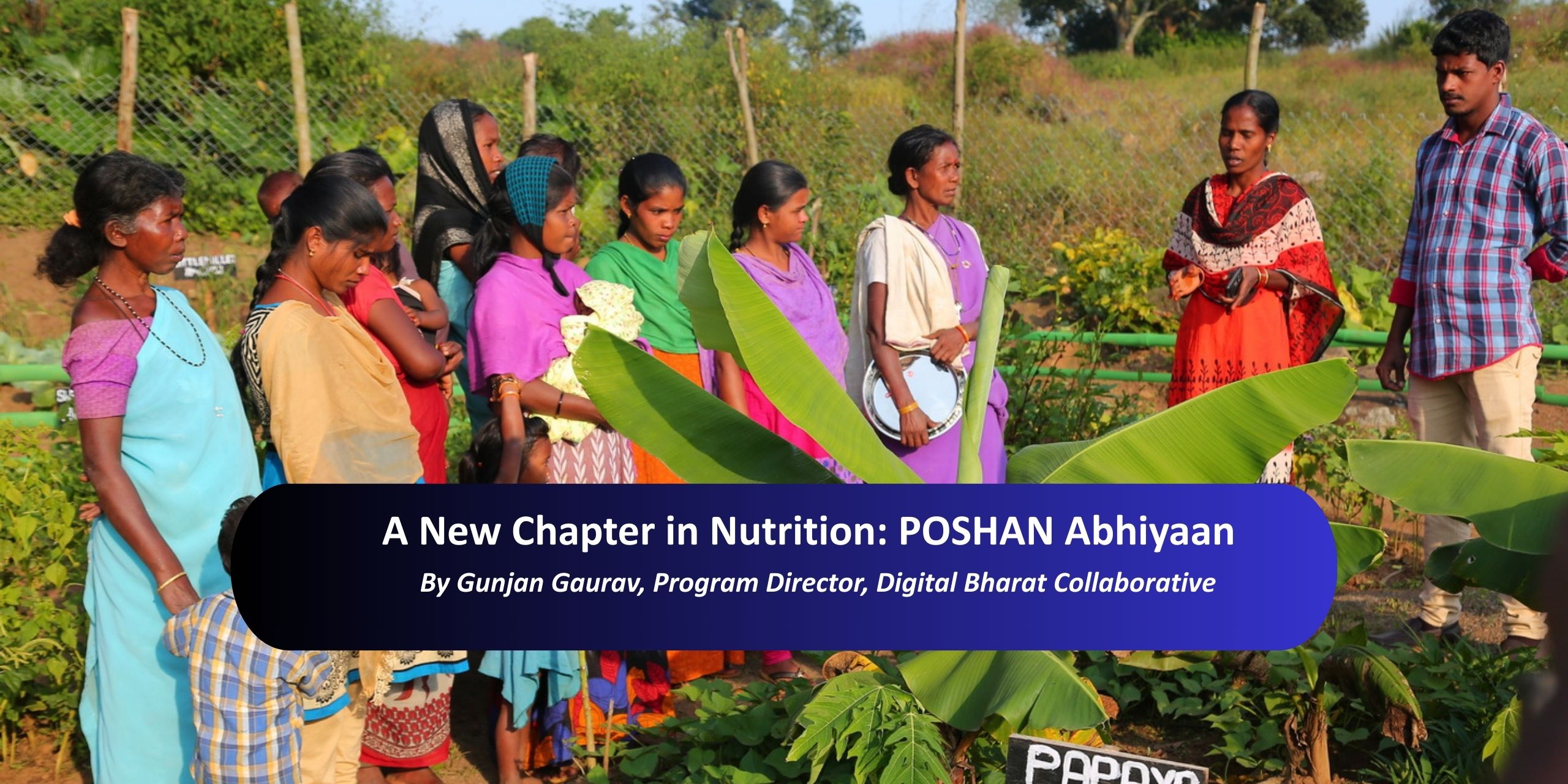

By Gunjan Gaurav, Program Director, Digital Bharat Collaborative
Every September, India celebrates Poshan Maah- a month dedicated to nutrition and the collective resolve to build a healthier nation. As a welfare state, India’s journey with nutrition has been long and layered, evolving from a focus on food security to a broader emphasis on tackling malnutrition.
In the years after independence, the Green Revolution addressed hunger, but micronutrient deficiencies persisted. In 1975, a new chapter in nutrition began with the Integrated Child Development Services (ICDS), which focused on supplementary nutrition, immunization, health check-ups, and pre-school education for children under six and their mothers. The launch of the Mid-Day Meal Scheme and the National Food Security Act further established India’s commitment to fighting malnutrition.
Despite its widespread reach, the ICDS struggled to tackle malnutrition effectively. It focused too heavily on supplementary nutrition while overlooking the first 1,000 days of life, when critical brain development occurs. Operational hurdles – weak targeting, patchy implementation, limited infrastructure, and lack of quality data and supervision- further limited its impact. A turning point came with The Lancet’s nutrition series in 2008 and 2013, which reshaped the global agenda by spotlighting the burden of malnutrition and highlighting evidence-based interventions to tackle it.
Building on these lessons, the POSHAN Abhiyaan, launched in 2018, marks a decisive shift in India’s nutrition strategy. It prioritizes the first 1,000 days- from conception to age tw- – through evidence-backed interventions. It leverages the Poshan Tracker for real-time data and drives a Jan Andolan to mobilize communities, together strengthening delivery and impact.
A Paradigm Shift in Approach and Mindset
As we mark the 8th Poshan Maah this September, it’s inspiring to reflect on how far India’s nutrition movement has come. Anganwadi workers and supervisors, once focused mainly on distributing Take-Home Rations and hot meals, now speak with passion and conviction about the first 1,000 days. They champion exclusive breastfeeding, complementary feeding, and dietary diversity as key interventions to strengthen nutrition in their communities. This shift is the result of sustained capacity-building through the Incremental Learning Approach and widespread Behavior Change Communication campaigns.
Review meetings at the district and block levels have undergone a profound transformation. Once confined to routine checklists- like infrastructure updates, court cases, or report submissions – they have now become dynamic, data-driven conversations. Powered by real-time insights from the Poshan Tracker, these meetings focus on monitoring
children’s growth, celebrating Annaprashan Day, strengthening counseling for mothers, and ensuring timely referrals for malnourished children.
POSHAN Abhiyaan has created multiple forums for convergence – through joint plans, regular meetings, and clearly defined roles for every contributor in the Jan Andolan. Malnutrition, once seen as the sole responsibility of ICDS, is now tackled collectively, with every department playing its part.
Accelerating Progress: Addressing Key Implementation Gaps
The POSHAN Abhiyaan has set us firmly on the right path, with clear strategies and impactful interventions. However, we must identify and address the key implementation issues.
A significant on-ground challenge is building the capacity of the supervisory cadre, specifically Lady Supervisors. While Anganwadi workers are crucial for service delivery, their effectiveness depends on strong, informed supervision. Yet, many supervisors lack the necessary training to go beyond routine checks and probe deeper into program quality and outcomes. They must be empowered with the use of tools like the Supportive Supervision feature on the Poshan Tracker.
While the Poshan Tracker has enabled data-driven discussions, this hasn’t consistently translated into stronger on-ground action. To bridge this gap, supervisors and CDPOs need a clear protocol for weekly review meetings that use data in order to drive solutions, not just discussions.
Finally, proper infrastructure is essential. Child-friendly Anganwadi Centres, with their own buildings, seating, light, fans, and functional growth-monitoring devices, are essential for a child’s holistic development. We must invest in saturating every AWC with these basic facilities.
The POSHAN Abhiyaan has undeniably created a more evidence-based, data-driven approach. To sustain this momentum and accelerate progress, we must bridge the gap between data and action, invest in our supervisory staff, and improve last-mile infrastructure.
About Gunjan Gaurav
Gunjan is a public health practitioner with 13 years of experience, driven by “Health for All,” passionate about making a meaningful impact, and energized by reading and thought-provoking discussions.